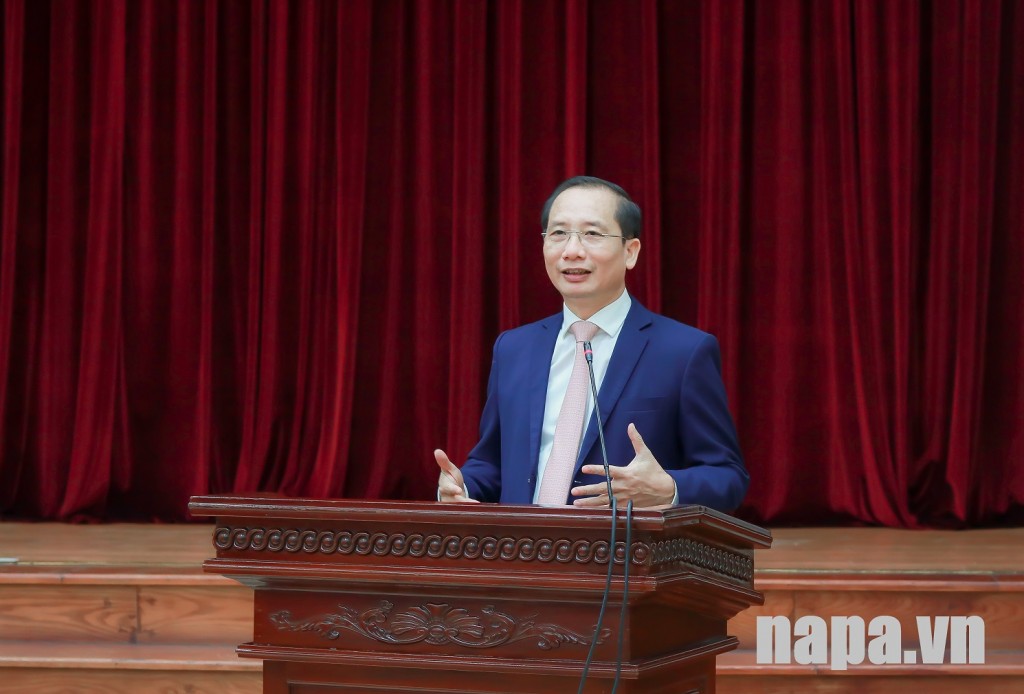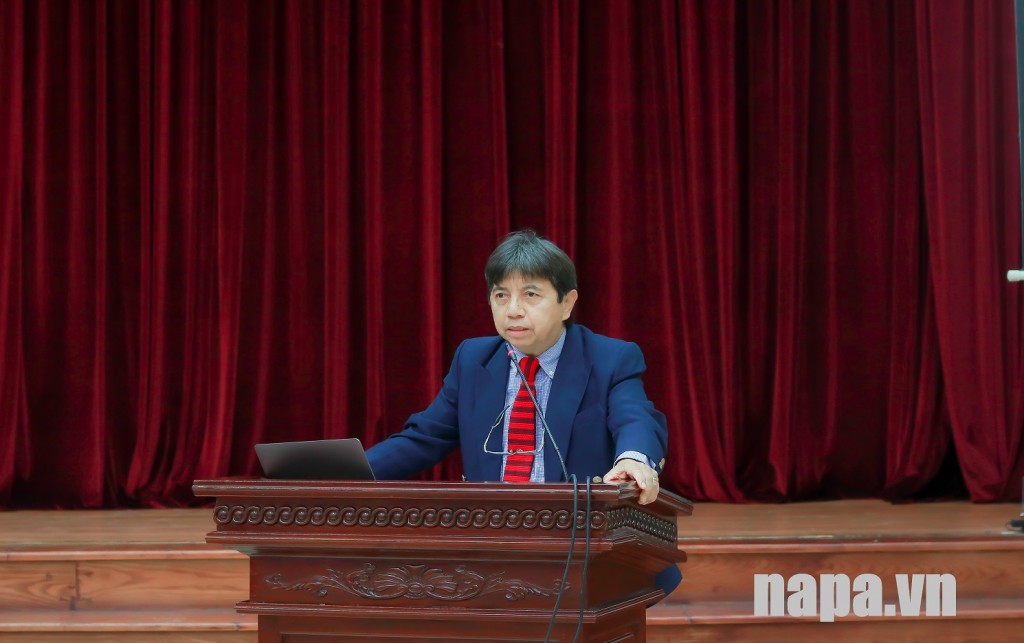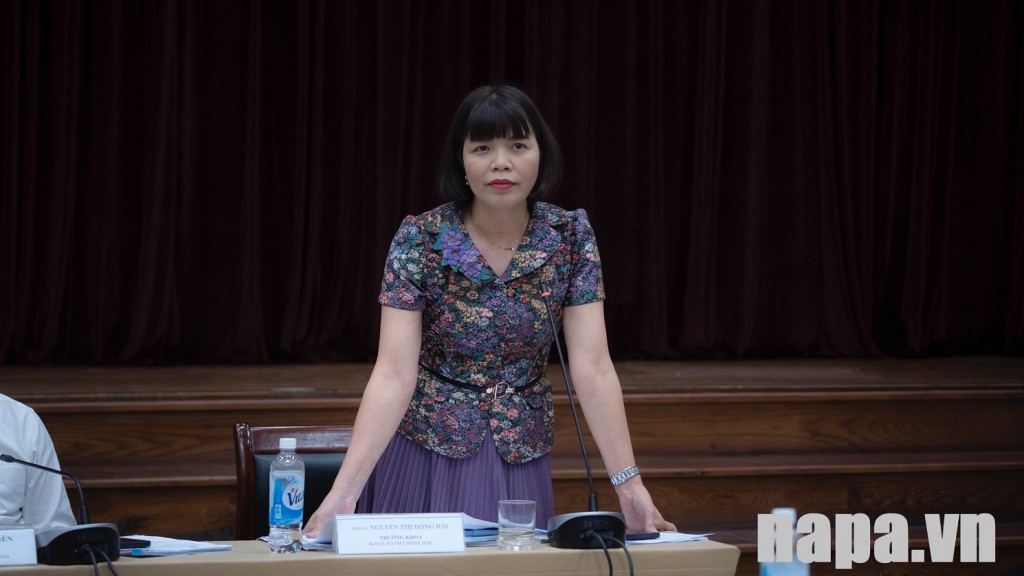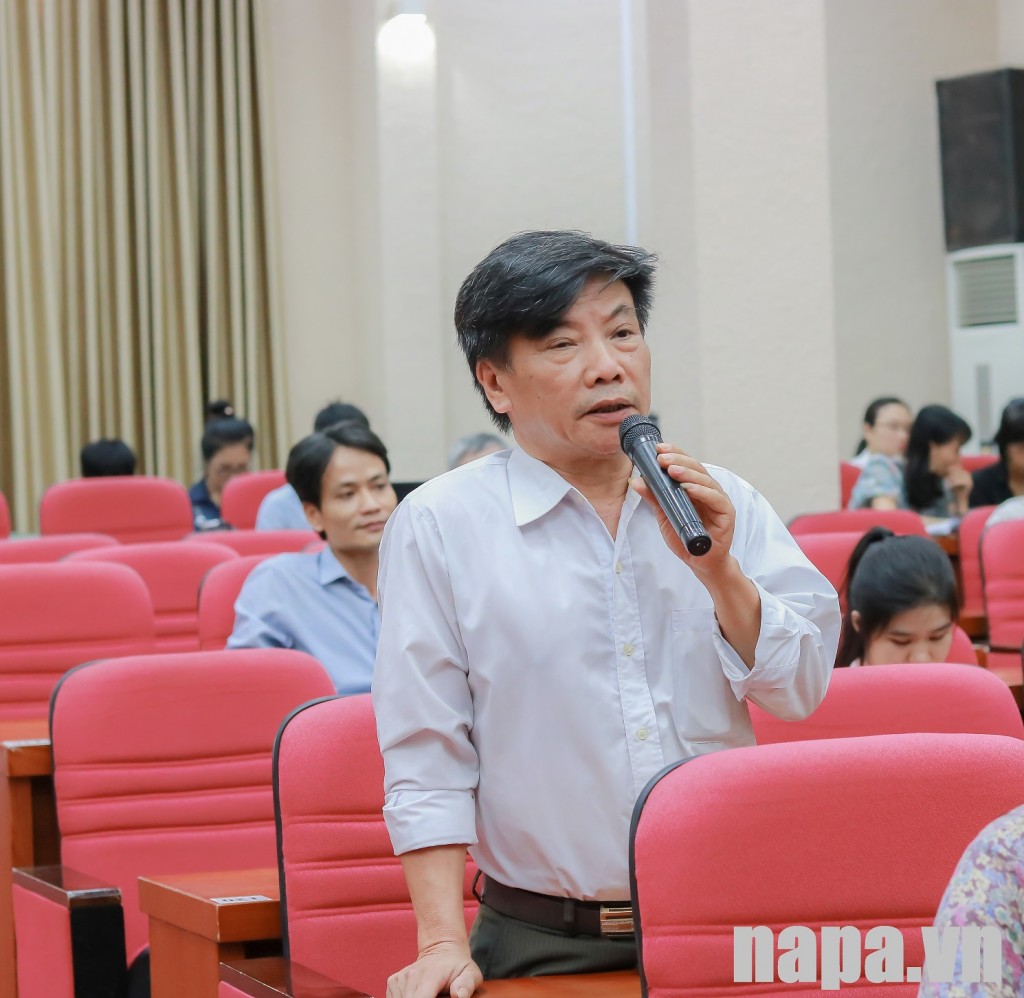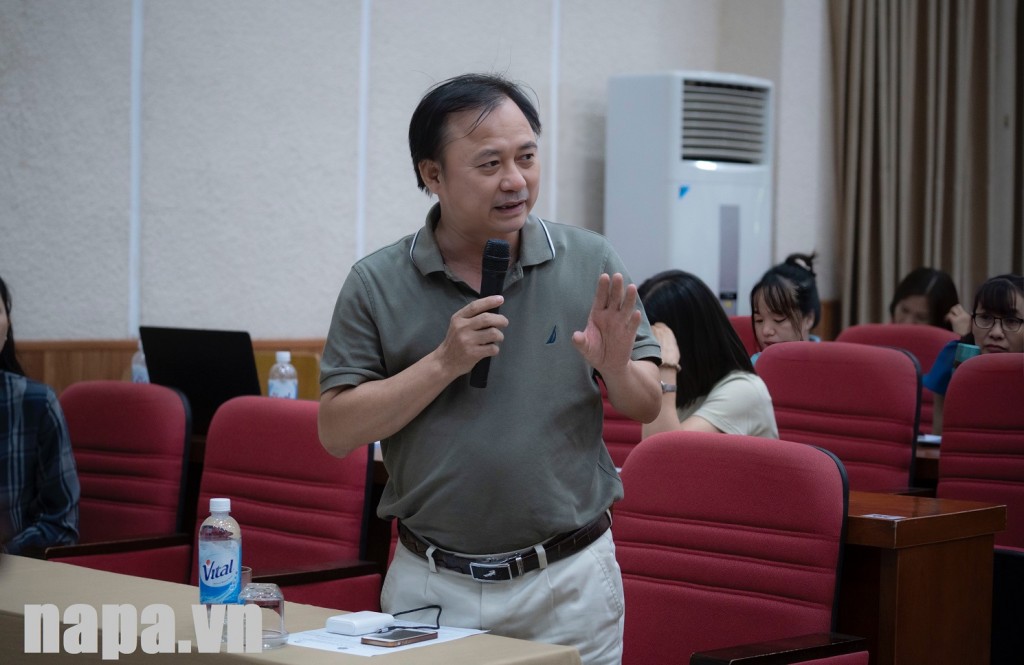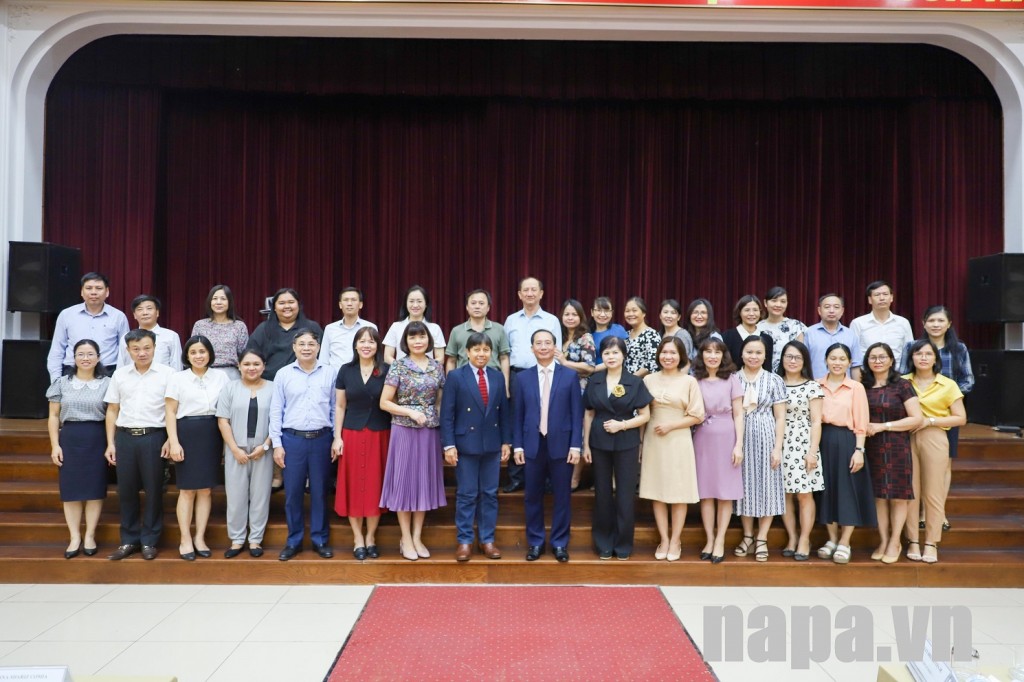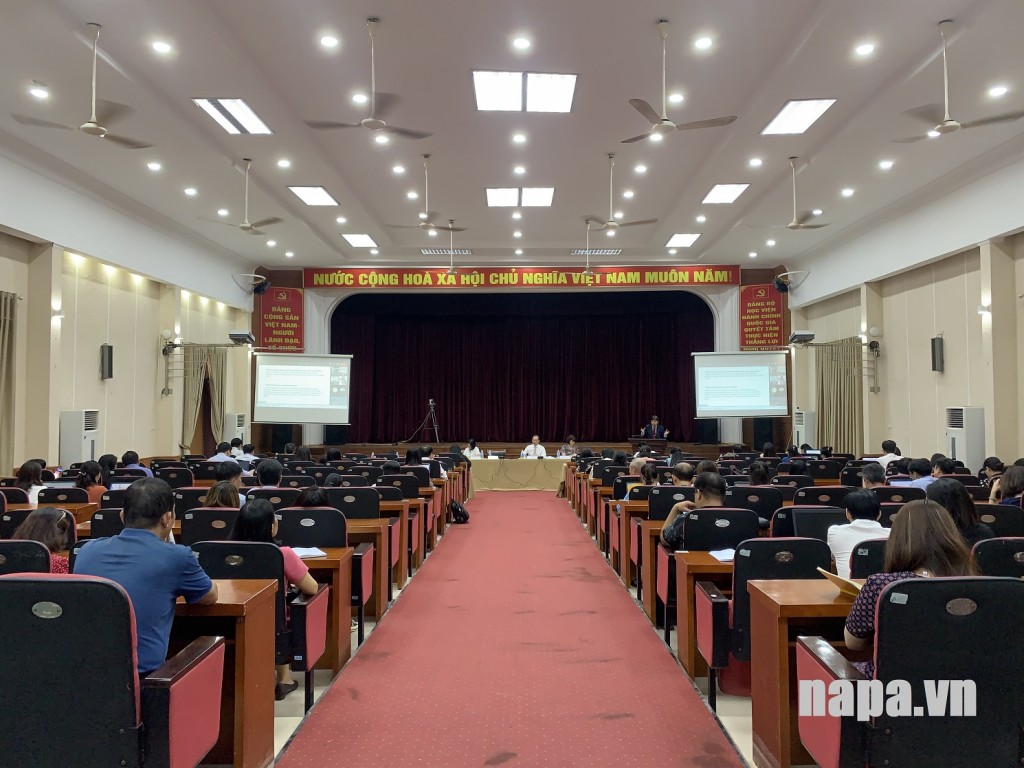On the morning of July 5, 2023, the National Academy of Public Administration (NAPA) and the Eastern Regional Organization for Public Administration (EROPA) co-organized a hybrid international seminar on “Ensuring the Balance of Theory and Practice in the public administration training”.
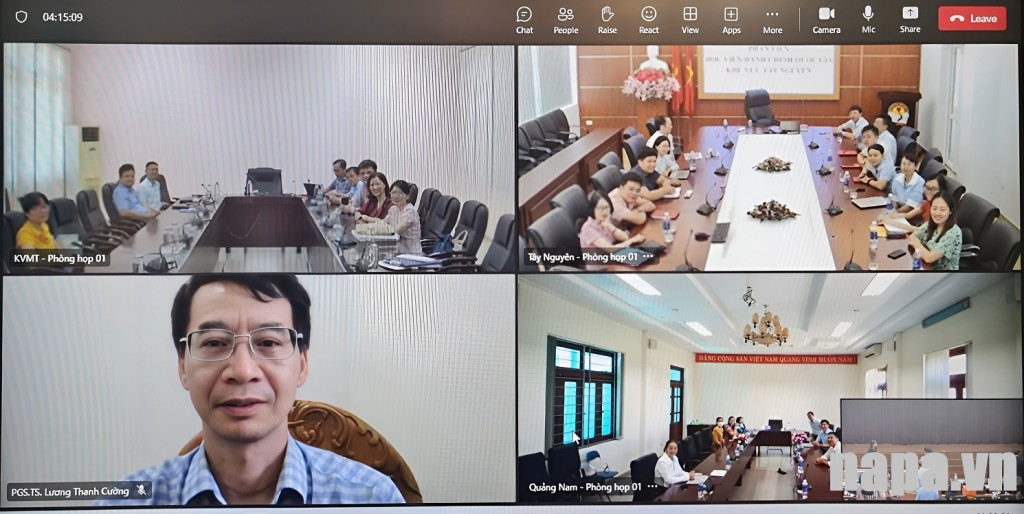
The seminar being conducted both in-person and through online broadcasting to reach participants at various locations
Dr. Alex Brillantes Jr., EROPA Secretary General and his colleagues attended the seminar.
On the side of NAPA was Assoc. Prof. Dr. Nguyen Ba Chien, NAPA President; Assoc. Prof. Dr. Luong Thanh Cuong, NAPA Vice President; Assoc. Prof. Dr. Nguyen Thi Hong Hai, Dean, Faculty of Administrative Sciences; leaders of NAPA units; NAPA scientists, trainers, and staff.
In the opening remarks, Assoc. Prof. Dr. Nguyen Ba Chien, NAPA President, expressed his pleasure to welcome Dr. Alex Brillantes Jr., Secretary General of EROPA, and his colleagues to the international seminar organized by NAPA and EROPA. This seminar was carefully deliberated and planned by both parties in terms of form and content.
Assoc. Prof. Dr. Nguyen Ba Chien emphasized the importance of striking a balance between theory and practice in administrative training and development, which is a fundamental aspect that significantly influences training quality. From program design to the delivery of trainers, careful consideration must be given to maintaining a harmonious blend of theory and practice. However, there have been shortcomings in achieving this equilibrium; researchers and trainers frequently emphasize excessive theoretical knowledge. Furthermore, the current program design is still rather theory-heavy. Without methods, without anchoring to real-life experiences, and without connecting to the practical realities faced by learners and various organizations, lectures may lack the vitality of real-world application. All of these factors influence the quality of training programs. While learners may gain a deeper understanding of theoretical issues, they may lack practical experience. This highlights the importance and necessity of ensuring a balance of theory and practice in administrative training.
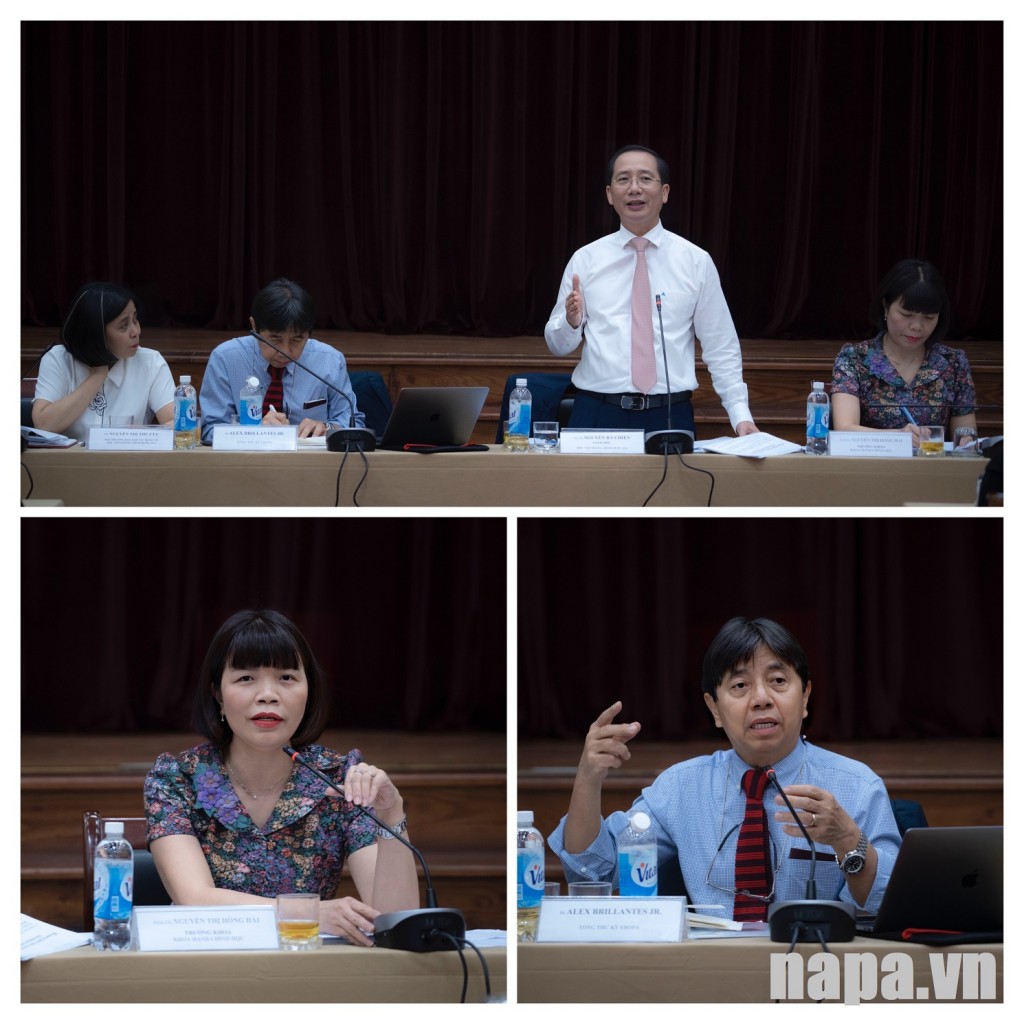
Dr. Alex Brillantes, Assoc. Prof. Dr. Nguyen Ba Chien and Assoc. Prof. Dr. Nguyen Thi Hong Hai co-chairing the seminar
Assoc. Prof. Dr. Nguyen Ba Chien hopes that Dr. Alex Brillantes Jr., an expert in public administration with extensive teaching experience at major institutions and consultancy work for companies, will contribute valuable insights during the seminar. Additionally, he expects that scientists and trainers attending the seminar will share practical experiences and exchange ideas about the shortcomings in Viet Nam. This will allow NAPA to adapt and strike a better balance between theory and practice in planning and administering the program, effectively meeting the needs of learners and enhancing the quality of training at NAPA.
In his presentation at the seminar, Dr. Alex Brillantes Jr., EROPA Secretary General, discussed the importance of achieving a balance between theory and practice in public administration training. He highlighted several key points regarding the connection between ASEAN training institutes on public administration and public management, aligned with the United Nations’ sustainable development goals. There are four points raised directly related to the NAPA training: (1) The role of theory and practice in teaching public administration and public management; (2) The current tendency of countries throughout the world to emphasize fundamental values and core aspects such as the 5Es (economy, efficiency, effectiveness, and equity, ethics) and A (accountability). (3) The training program aiming to ensure the values of equity, ethics, and accountability; (4) Striking a balance between theory and practice is reflected in the training outcomes, where learners acquire new knowledge and skills; they gain the ability to provide policy advice and influence to ensure the goals of equity, equality, accountability, and ethics in public sector operations.
Speaking at the seminar, Assoc. Prof. Dr. Nguyen Thi Hong Hai emphasized the need to associate the practice with the Vietnamese context and find a balance between theory and practice, taking into account the models from countries around the world and their applicability to Viet Nam. She raised the question of whether the theory is aligned with the political and legal aspects and legal framework for implementation in Vietnam, highlighting the importance of relevance. Assoc. Prof. Dr. Nguyen Thi Hong Hai highly appreciated the two significant issues mentioned by Dr. Alex Brillantes Jr., namely the Fourth Industrial Revolution and the context of international integration, as well as the responsibilities of nations and their members in addressing global challenges.
At the seminar, the participants engaged in discussions with the co-chairs of the seminar.
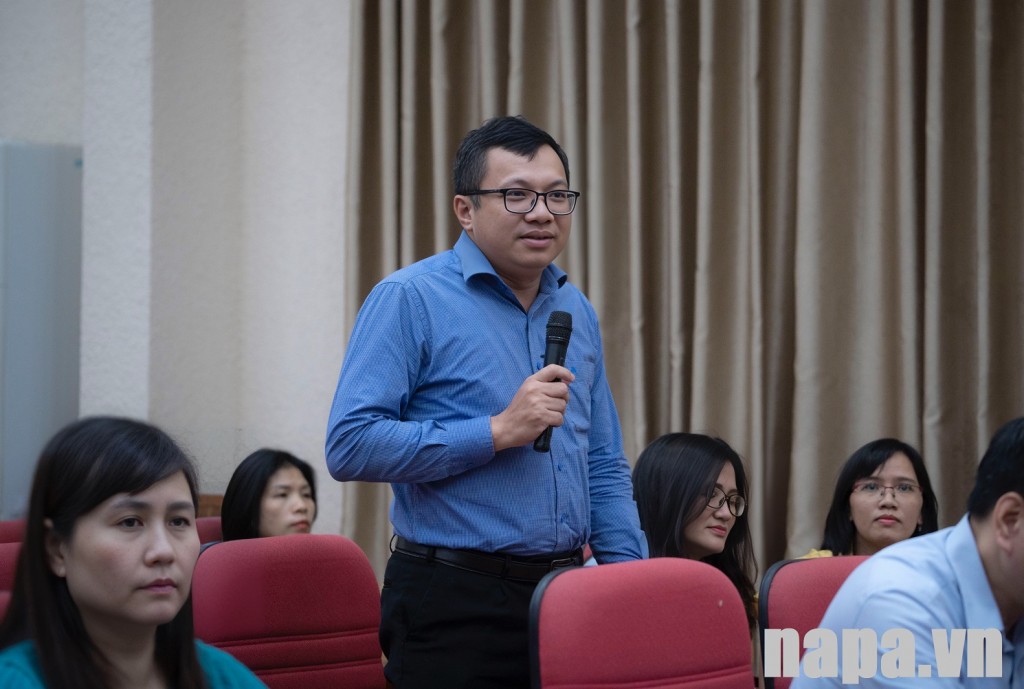
Assoc. Prof. Dr. Tran Nghi Thanh, trainer at the Faculty of Interdisciplinary Sciences, speaking at the seminar
According to Assoc. Prof. Dr. Tran Nghi Thanh, trainer at the Faculty of Interdisciplinary Sciences, the Philippines and the United States of America share similarities in terms of government structure, management model, public services, local governments, accountability, and administrative culture. So, what distinguishes the Philippine public service from that of the USA, and vice versa? Based on his experience, which factors determine the effectiveness of public sector training today?
Dr. Alex Brillantes Jr. shared that the Philippines built its administrative model based on its contextual appropriateness and superiority. It requires adjustments and is grounded on a scientific basis, aiming to target specific individuals as well as the leadership capacities at different management levels. Furthermore, there is a shift in the mindset and awareness among the faculty members when interacting with learners, enabling them to share and gain significant practical experiences from the learners.
Assoc. Prof. Dr. Huynh Van Thoi, Deputy Director in charge of NAPA Ho Chi Minh City Campus, raised the issue of challenges encountered by trainers with extensive theoretical knowledge when teaching to a target audience of in-service public servants at both central and local levels who already have practical expertise. So, what approaches, mechanisms, and measures maintain the balance between theory and practice?
In response to this question, Dr. Alex Brillantes Jr. suggested that both trainers and learners should collaborate in creating knowledge. Trainers act as guides, facilitating discussions to unearth the wealth of knowledge from the students, and the key factor lies in the connection and active involvement of the students during the learning process.
MSc. Le Van Khai inquired about the experience of balancing theory and practice in public administration training for various target groups (those without experience and those with experience in state management).
Dr. Ta Quang Tuan believes that the development of training programs for different target groups should be tailored to their specific needs. However, there is no set ratio between theory and practice in Viet Nam. So, what principles should be followed in the development of training programs to achieve a balance between theory and practice?
According to Dr. Alex Brillantes Jr., we should invite outstanding and renowned public sector leaders and practitioners to exchange and share their successful experiences at training programs. This allows learners to hear from real-life experiences and helps change their perspectives and awareness. Additionally, there should be a change in the mindset of the teaching staff by using the learner-centered approach, where knowledge is shared, and real-life experiences are heard from learners coming from different fields and localities. This will provide additional insights into the practical aspects of work in different regions where the learners work.
With this content, Assoc. Prof. Dr. Nguyen Ba Chien shared that the development of programs must be founded on the principles of Party cadre building, the requirements of the Vietnamese public service, and a practical survey for each target group of learners.
Assoc. Prof. Dr. Nguyen Thi Hong Hai believes that how to integrate theory and practice in teaching public administration and public management is an important topic for NAPA at the moment. The discussion at the seminar, including the profound insights shared by Dr. Alex Brillantes Jr. and the opinions stated by trainers, leaders, managers, and those responsible for the development, were highly valuable. The aim is for NAPA to have a program that effectively connects theory and practice. The focus is on key issues:
To begin with, the importance of integrating theory and practice in the training and development programs of NAPA for both experienced and inexperienced individuals in state administration.
Second, unlike private businesses, the participants in the public sector, which is the mission of NAPA, involve training a workforce of officials, civil servants, and public servants who are oriented towards the core values of the public sector. This includes factors related to fairness, equality, and responsibility within the context of digital transformation, building a digital government, international integration, and adapting to the needs of learners.
Third, attachment to practice requires changing the learners’ perceptions, thinking, and action capabilities, resulting in reform and innovation in their respective fields as well as contributing to policy advice and policy-making within the administration and the public service in general.
Fourth, because the roles of leaders, managers, learners, and trainers are extremely crucial, the program and materials must be carefully designed. Based on the Party’s principles, guidelines, and orientations in building the existing contingent of cadres and civil servants, as well as considering the current condition and intended aims of the public service and administration, what direction we are heading? Examining the practical demands of learners is essential in order to include them in the training content, as well as to ensure the flexibility of the trainers.
Concluding the seminar, Assoc. Prof. Dr. Nguyen Ba Chien expressed gratitude for the valuable and insightful contributions of Dr. Alex Brillantes Jr. and the trainers and delegates attending the seminar regarding the issue of balancing theory and practice. According to him, it is up to every one of us to adapt our thinking to keep up with the development of society and NAPA itself. The training staff is equipped with knowledge and explores models from countries around the world, but they must “localize” these models to align with the conditions of Viet Nam and the directions of NAPA in developing and implementing training programs. It is necessary to integrate practice with theory, determine the appropriate number of theoretical issues to reinforce the theory and compare and contrast it with practical applications. We need to harness the collective strength of knowledge, change our mindset, and elevate the awareness of both the trainer team and the learners.


